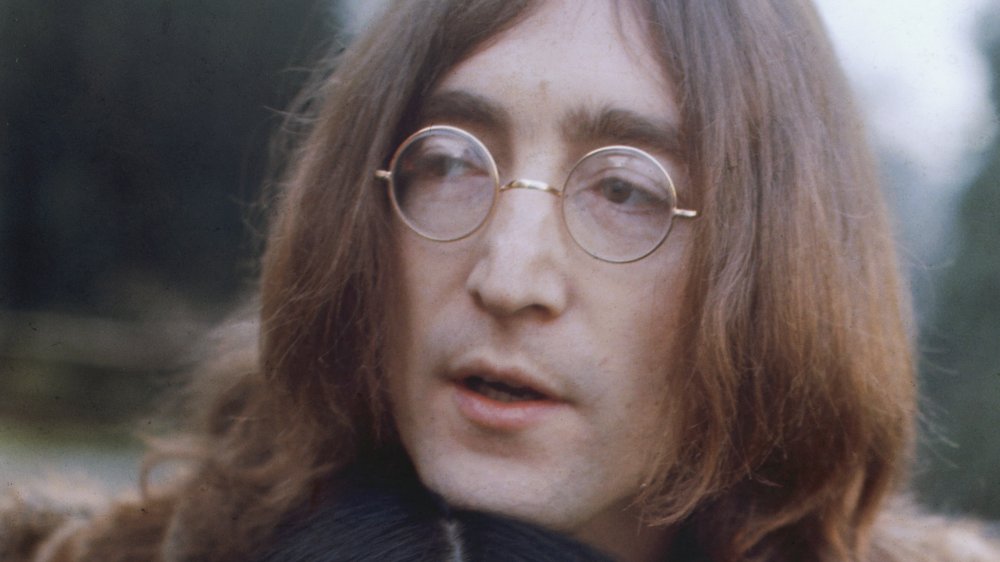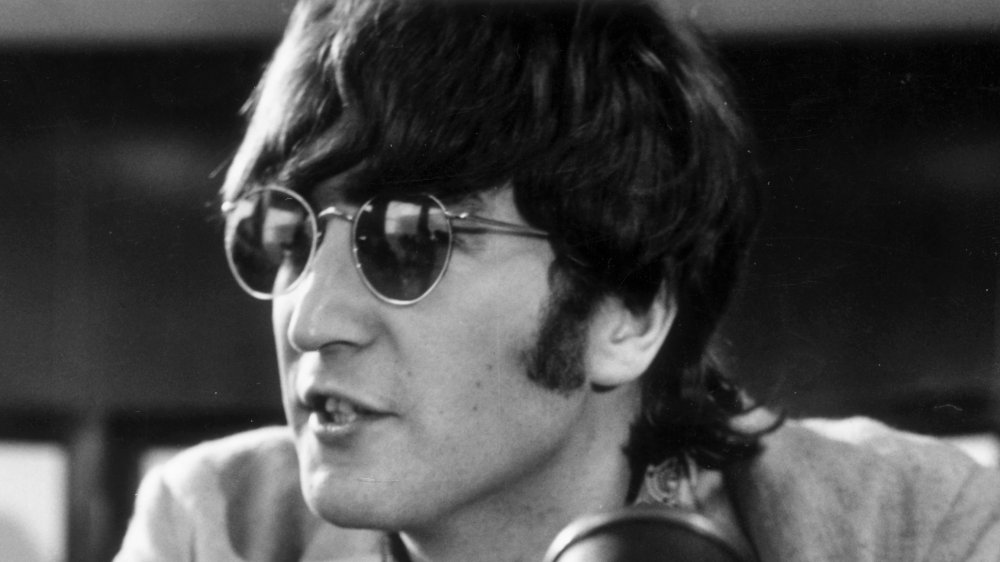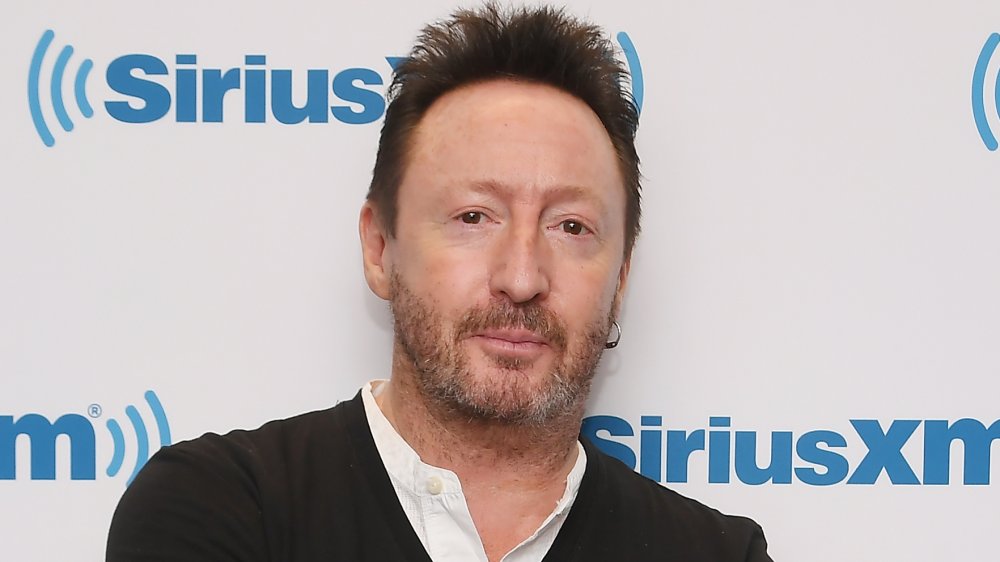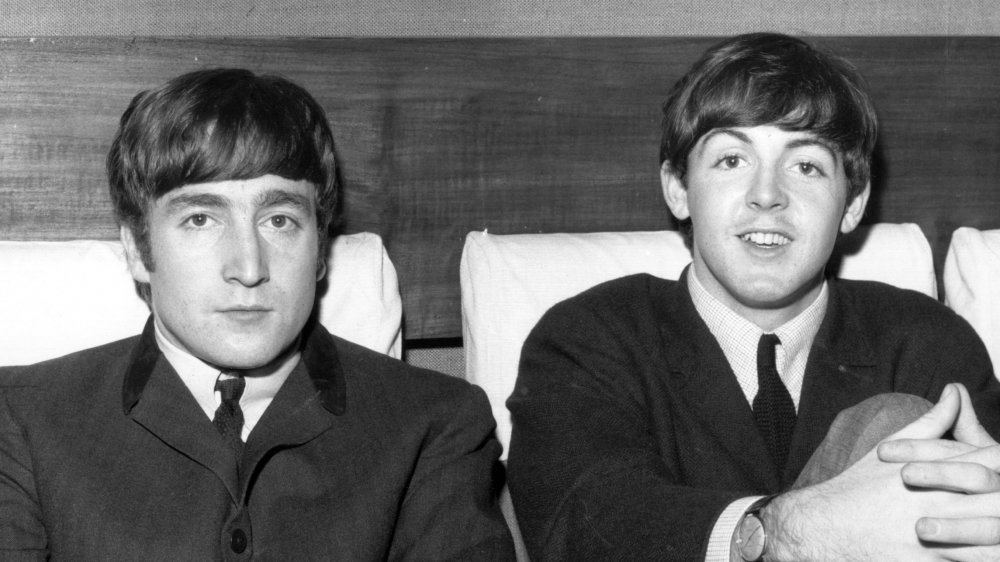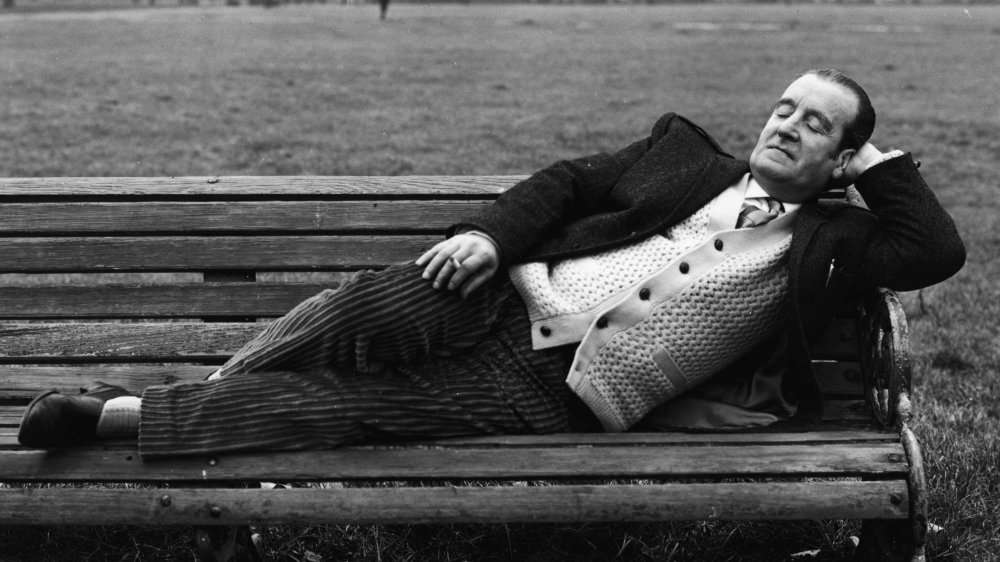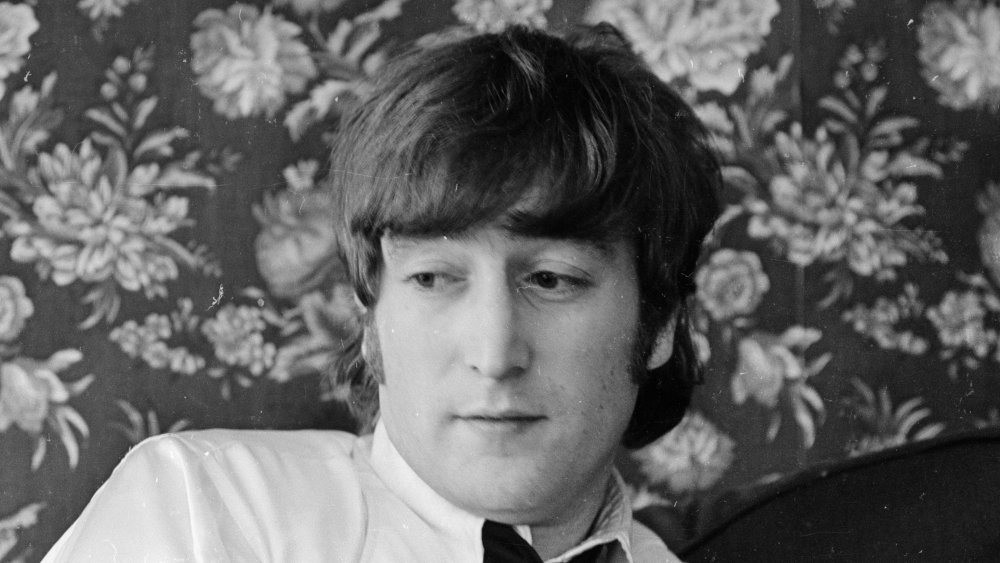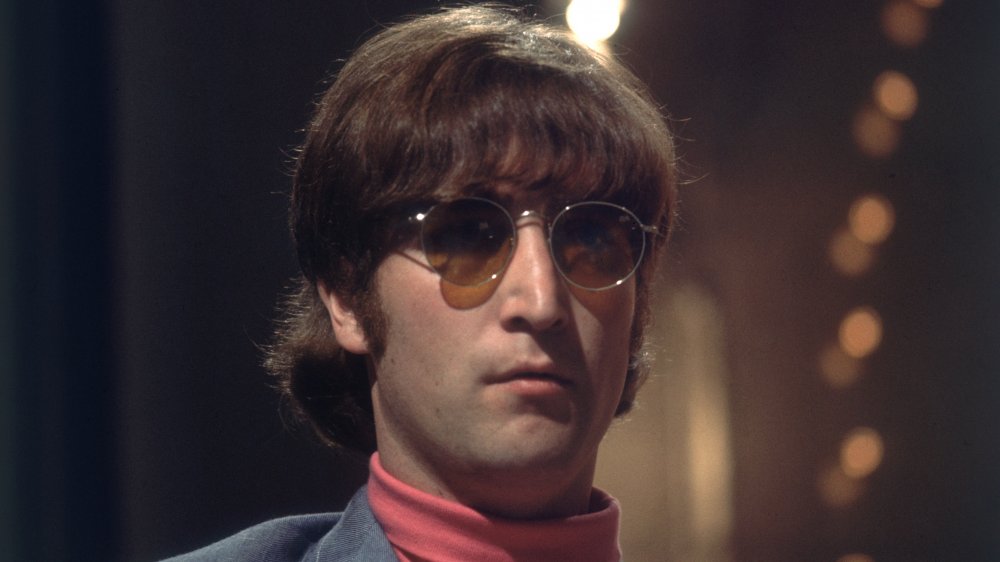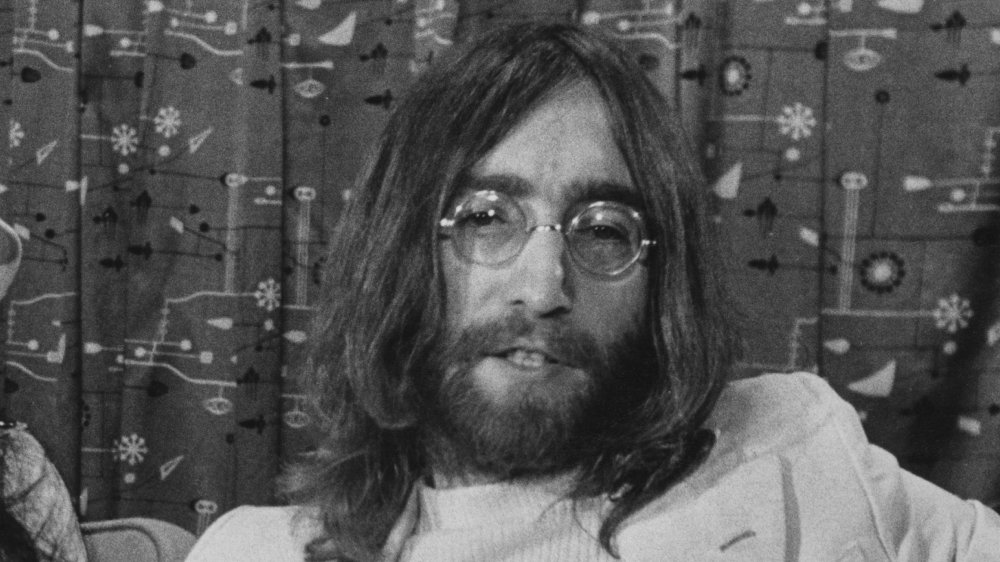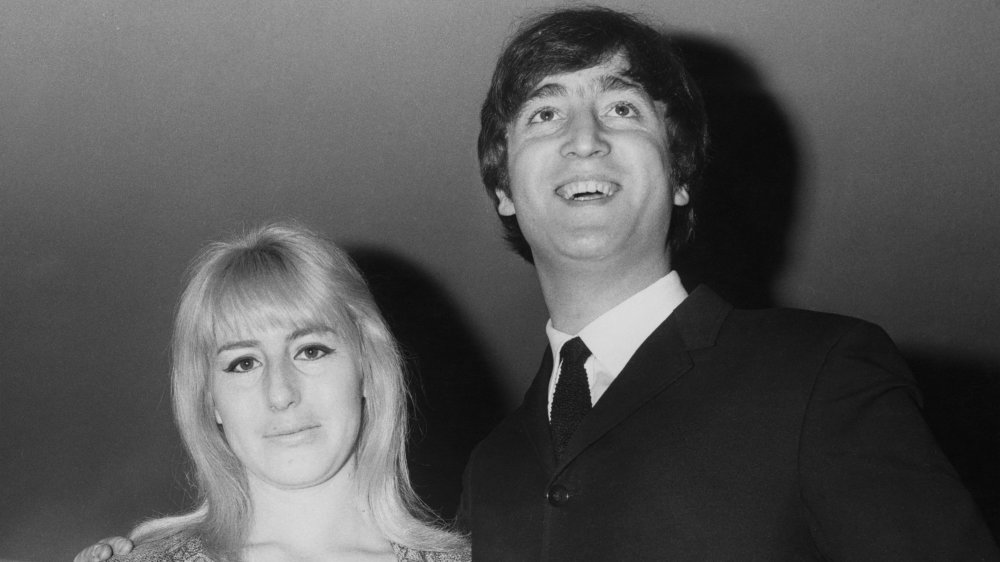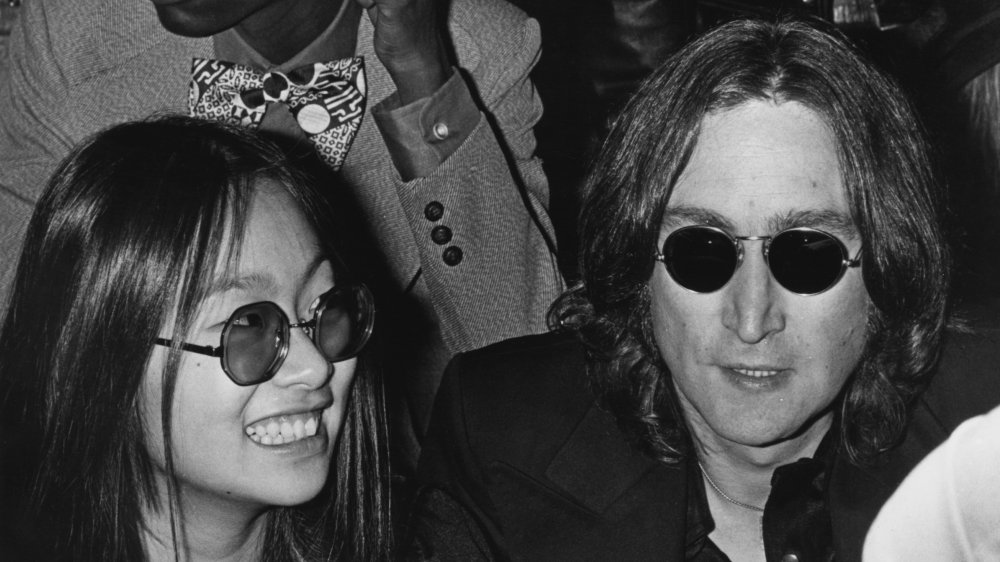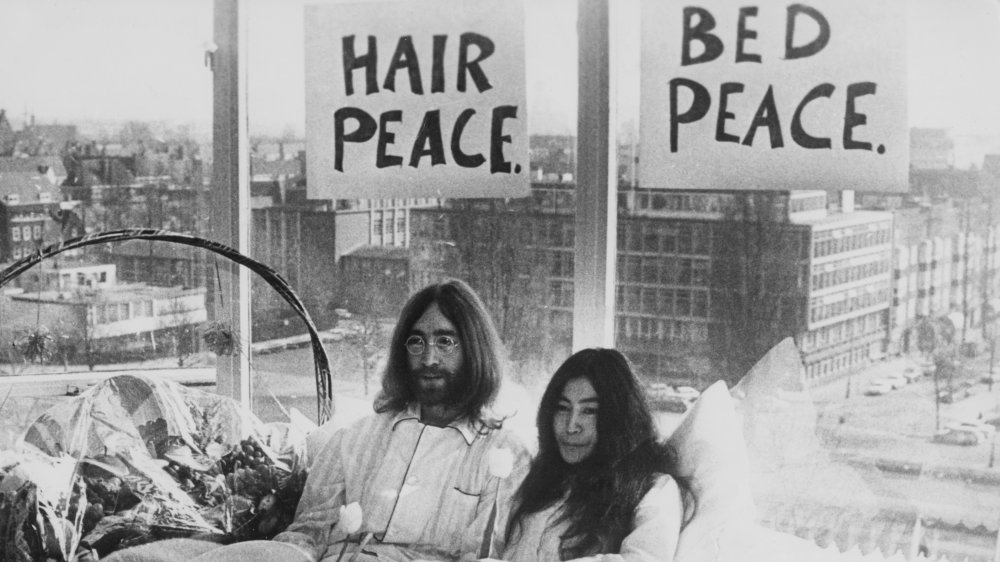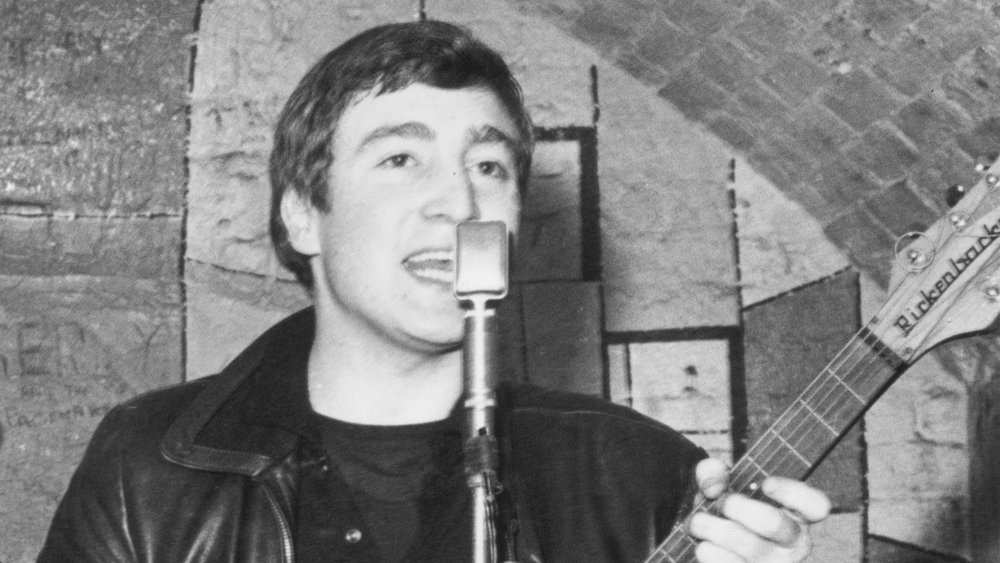The Troubled History Of John Lennon
Few people have had a more profound influence on pop culture and music than John Lennon. With Paul McCartney, he's one half of arguably the greatest songwriting partnership of all time. With the Beatles, he claimed to be "more popular than Jesus." He was one of the most famous anti-war advocates of his time, and his solo career spawned such time-tested hits that the merest mention of the word "imagine" is likely to make that song play in your head.
Still, despite his significant accolades and a life spent in a brighter spotlight than almost any other artist, Lennon's time in this world was far from blissful. In fact, his personal life was a nigh-continuous stream of chaos and disastrous events — some cast upon him by cruel fates, others caused by his own, often less-than-pleasant demeanor. Come, let's dig deep in the dark underbelly of the controversial ex-Beatle's life. This is the tragic real-life story of John Lennon.
The assassination of John Lennon
It's impossible to talk about the many tragedies in John Lennon's life without mentioning the way said life ended. As Biography tells us, Lennon was famously assassinated by Mark David Chapman, who gunned the 40-year-old musician down in front of his own home on December 8, 1980. Weirdly, this wasn't the first time Lennon and Chapman's paths intertwined. On roughly 4:30 p.m. of that day, a young, oddly "timid" and "awkward" fan approached Lennon on the street. The ex-Beatle signed the Double Fantasy album the fan was holding, and his friend Paul Goresh snapped a few photos of the two together. The fan turned out to be Chapman, who would send five hollow-point bullets at the artist a little over six hours later, while still holding the signed album.
As The Denver Post notes, Chapman targeted Lennon simply because the artist was famous, and his motivation was "attention, bottom line." He was inspired by the novel The Catcher in the Rye, and he went through with his heinous deed despite the kindness Lennon showed him. Chapman has since come to regret his crime.
In a strange twist of photographic fate, the day Lennon died also produced one of the most iconic images of his life — one that decidedly doesn't feature Chapman. Mere hours before the singer's death, legendary photographer Annie Leibovitz shot the famous Rolling Stone cover image where a nude Lennon embraces the clothed Yoko Ono on the floor.
John Lennon's awful relationship with Julian Lennon
John Lennon's son from his first marriage, Julian Lennon, clearly got some of his late dad's artistic genes and world-improving tendencies, as he's a photographer, musician, documentary filmmaker, and philanthropist in his own right. However, he doesn't particularly appreciate his father's peacenik public image. In a 1998 interview with The Telegraph, he labeled Lennon a "hypocrite" who preached about peace on earth, yet had no love for him or Julian's mother, Cynthia. From Julian's viewpoint, Lennon was a fairly bad dad — an uncommunicative, adulterous head of a family that was eventually torn apart by a divorce.
However, Julian's animosity towards his father doesn't extend to the ex-Beatle's "other family," who Lennon loved enough to even become a househusband at one point. He says he's on good terms with Yoko Ono's son, Sean Lennon, though Sean seems less enthused about keeping in touch than he does. He also has respect for Ono herself, even if he doesn't always agree with her.
His whole life was a 'cry for help'
When your longtime band mate and songwriting partner calls your entire life "a cry for help," it's a good sign that you might not lead a particularly happy existence. According to Billboard, this is precisely what Paul McCartney said about John Lennon when discussing their chart-topping 1965 song "Help!" McCartney's assessment stems from his realization that Lennon, he thinks, was "always looking for help." McCartney says that the fact that Lennon lost his father, uncle, and mother at an early age left the man with a paranoid feeling that "people died when he was around."
Lennon himself verified at least a part of his old partner's assessment. He once said that "Help!" was an actual cry for help at a time when he was "fat and depressed," though he also chose to use the upbeat nature of the song to hide his pain.
His father left the family
Acording to Ultimate Classic Rock, John Lennon had a strained relationship with his father. Alfred Lennon separated from Julia Lennon in 1944 (John, as Biography notes, was born in 1940). As a result, Lennon says that he "never knew his father" and didn't see him much until he became famous, at which point Alfred mysteriously turned up again. Lennon tells us that the reunion didn't go particularly well. As he explained, "I saw him and spoke to him, and decided I still didn't want to know him." Fair enough, but ouch.
In 1965, the Beatles were at the top of the world, and a talent manager called Tony Cartwright discovered Alfred working at a pub. Cartwright shaped Alfred, who was a talented singer himself, into "Fred Lennon," and attempted to turn him into a recording artist. Unfortunately, his "awful" debut album didn't sit well with the younger Lennon, who reportedly asked his manager Brian Epstein to "do anything he could to stop it." Whether Epstein used his industry clout to do this or not, Alfred Lennon's singing days were soon over, and his record never charted.
John Lennon only ever saw his father one more time, in 1970. Lennon (who was into both drugs and primal scream therapy at the time) grabbed Alfred by the collar and screamed at him, ordering his father to "get the hell out." Alfred died in 1975, and Lennon eventually expressed regret that he didn't handle their last meeting better.
John Lennon's uncle met a tragic fate
The aptly named George Toogood Smith was John Lennon's uncle through marriage, and indeed, he was too good for this world. According to the St. Peter's Woolton Heritage site, Lennon lived with Smith (a dairy farmer) and his wife, Lennon's aunt Mary Elizabeth Stanley, for most of his childhood. A father figure and a profound influence for young Lennon, it was Smith who taught the Beatle-in-the-making to read, paint, and draw. He even bought the boy a musical instrument, a mouth organ. Unfortunately, the good times weren't meant to last. In 1955, the 52-year-old Smith "collapsed" at his home and died of a liver hemorrhage. Smith's (too) good name has not been lost to history, and neither has his final resting place. According to the Liverpool Echo, his grave was lovingly restored and unveiled in 2015 as part of Lennon's 75th birthday celebrations.
Oddly enough, Smith's demise may have inspired the Beatles classic "Eleanor Rigby" in a roundabout way. The BBC reports that the churchyard Smith was buried on also contained the grave of a maid called, yes, Eleanor Rigby. Both Lennon and Paul McCartney frequented the churchyard, and although McCartney insists that he made up the name and the character, some speculate that he may have subconsciously picked up the name from the gravestone.
His mother died in a strange accident
One of the worst moments in John Lennon's life came in July 15, 1958, when, as the Beatles Bible tells us, his mother Julia Lennon died in a freak accident. Although the future superstar lived with his aunt and uncle, Julia and John were close. She was supportive of his musical endeavors and even bought him his first guitar. Imagine the 17-year-old Lennon's shock, then, when his mother left his aunt's house ... and was run over by an off-duty policeman when crossing a road on her way to the bus stop. She died instantly. The cop, Eric Clague, was neither speeding nor drunk (despite allegations). According to him, "Mrs. Lennon just ran straight out in front of me. I just couldn't avoid her. I was not speeding, I swear it. It was just one of those terrible things that happen."
It was certainly a terrible thing, and it had a deeply traumatizing effect on Lennon. As for Clague, he eventually realized that the woman was the mother of the John Lennon, and Lennon's fame made sure that he kept being reminded of the gruesome accident. Clague ultimately resigned and became a postman ... only to discover that his round included the family home of one Paul McCartney, and he now had to haul hundreds of fan letters to the band mate of the guy whose mother he had killed. Some memories, it seems, you can't escape no matter what.
Lennon's heroin addiction
John Lennon liked his drugs, and as Salon tells us, one particular drug might've affected him to the point that it played a part in breaking up the Beatles. Lennon was quite addicted to heroin in 1969, when many interpersonal gripes were already straining the Fab Four. It was a time when opioid addiction was poorly understood, and George Harrison, Paul McCartney and Ringo Starr watched in increasing alarm as Lennon and Yoko Ono openly partook of the drug, which the three recognized as something much more "far-out" than they were willing to get.
Lennon attributes the couple's heroin use to the "real pain" they felt after Ono's miscarriage in 1968, though others insinuate he started earlier. He has also claimed that heroin was his way to rebel against the other Beatles and their unwillingness to "accept Ono as their equal." Regardless of Lennon's addiction origin story, his heroin use and the "mood swings" that came with it became a real problem after a nasty car accident in Scotland. By the time the band started recording Abbey Road, the three other Beatles had to be careful around Lennon because of his "explosive rages," and they were unwilling to challenge his insistence on keeping Ono on hand in the studio (which they normally would've done) because they could also see that their band mate was in pain.
The Beatles didn't last long after Abbey Road. Ono and Lennon eventually quit heroin, though.
John Lennon, domestic abuser
As Sydney Rodosevich of The Daily Californian writes, John Lennon might be an esteemed artist and a well-known advocate for peace, but in his private life, he could be a violent man. Unfortunately, this violence very much extended to the women in his life, particularly in his youth. In 1980, Lennon almost casually admitted that he had a history as a domestic abuser, and that he had physically hit his ex-wife Cynthia Lennon. He said that the song "Getting Better" on Sgt. Pepper's Lonely Hearts Club Band, which features lyrics about "being cruel to my woman," beating her, and keeping her "apart from the things that she loved" was about him. "I was a hitter," Lennon admitted. "I couldn't express myself and I hit."
Lennon did also say that he "sincerely [believed] in love and peace," that he became a changed man, and that he was genuinely regretful of his past actions. However, as Rodosevich points out, the superstar's wife-beating past is a serious dilemma for the socially conscious fan. What's more, some have wondered whether Lennon's violent tendencies also applied to his first-born child, Julian Lennon. Julian himself doesn't say, but he has noted that he considers his father a "hypocrite" who never showed him and his mother the love and peace he was preaching to everyone else.
John Lennon and the 'lost weekend'
In the summer of 1973, John Lennon's marriage with Yoko Ono was in trouble. As Ultimate Classic Rock tells us, they were reeling from the commercial and critical disappointment of Lennon's Ono-produced Some Time in New York City, and Ono has told The Telegraph that the constant hate their union drew was slowly ruining their careers and her vibes. Ono wanted a break from the whole "she broke up the Beatles" thing, and she needed one from Lennon, too. Her solution? She set Lennon up with a mistress.
Ono and Lennon had an assistant named May Pang (pictured), whom Ono trusted and who she knew Lennon had the hots for, so she proposed that the pair should start an affair. Unfortunately, Lennon's vision of the affair was overindulgent, to say the least. The musician and Pang eloped to Los Angeles, where the suddenly wife-free Lennon started "exercising all his bad habits," drinking heavily and generally going all Mötley Crue for almost two years before he and Ono decided to start anew in 1975. While the musician did finish no less than three albums during this time period known as the "lost weekend," the creative process was usually booze-filled and bizarre. It probably didn't help that one album, Rock 'n' Roll, was produced by a very unpredictable Phil Spector, who often turned up in outlandish costumes and once even fired a gun into the ceiling.
His struggles with the FBI and President Nixon
John Lennon's most famous enemies might've been Paul McCartney (on occasion) and the concept of war, but he had two other adversaries who were arguably even more powerful: President Richard Nixon and the FBI. According to Ultimate Classic Rock, the Bureau took a dislike to the musician's political activism around 1971 and started waging a five-year war against the former Beatle. The federal file on Lennon was opened when he performed at "a rally for John Sinclair of the White Panthers," a guy who'd recently been handed a ten-year jail sentence for the heinous crime of selling two marijuana joints. Fortunately for Sinclair, he was soon released. Unfortunately for Lennon, his appearance at the rally put him in the FBI's bad books — a really bad place for a man who had recently moved in New York City.
The government harassed Lennon for years, collecting a 300-page file on the musician and trying to deport him on a semi-regular basis. According to Gimme Some Truth: The John Lennon FBI Files, President Nixon had a hand at this, as he thought Lennon's political activism might endanger his re-election. In the end, however, Lennon was able to weather the storm. When the Watergate scandal brought Nixon to his knees and forced him to resign in 1974, the pressure against the ex-Beatle finally eased. In 1976, Lennon was finally able to secure a green card.
John Lennon and plagiarism allegations
Being titans of rock and pop innovation, the Beatles aren't the first group you'd suspect of plagiarism. If anything, one would assume they're the ones being plagiarized in any given situation. Nevertheless, 101.5 WPDH tells us John Lennon was once accused of getting a little too "inspired" by another song. The song that drew plagiarism accusations wasn't just any old B-side filler track, either. It was "Come Together," a standout track on Abbey Road and one of the Fab Four's most famous songs.
According to the lawsuit by music producer Morris Levy, Lennon straight-up plagiarized "Come Together" from Chuck Berry's 1956 song "You Can't Catch Me." While Lennon did admit he drew inspiration from Berry's song, Levy said that Lennon had actually just slowed down "You Can't Catch Me" and presented the end result as his own. Allegedly, Lennon even stole some of the lyrics, as both songs contain a very similar line. Lennon's version goes, "Here come ol' flattop, he come groovin' up slowly," while Berry's is, "Here come a flattop, he was movin' up with me." Hmm.
Lennon settled the lawsuit out of court, and he spent the next few years law-feuding with Levy over specifics in the agreement. Levy took Lennon to court for failing to record one of the three songs the settlement agreement required the Beatle to record for Levy, and Lennon later returned the favor when Levy released a bootleg album featuring his old recordings.
